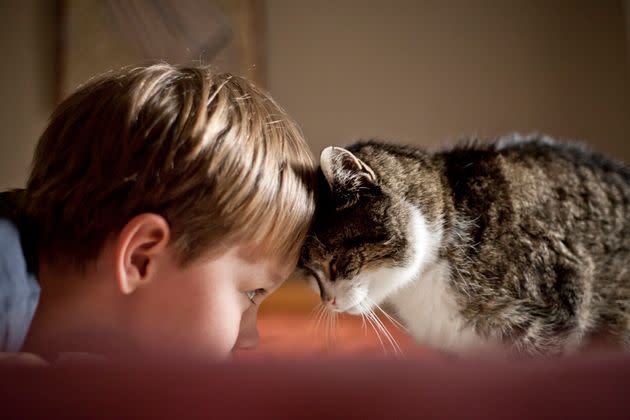Here's The Real Reason Why Your Cat Headbutts You, And It's Pretty Heartwarming

You might already know that cats can tell time and that they probably do realise when you’re calling them (even if they refuse to respond).
So they’re pretty knowledgeable. But what about their inscrutable feline feelings?
Contrary to some stereotypes, cats do bond with their owners, though the nature of that attachment is up for debate.
One thing most cat experts agree on, though, is this ― a headbutt from your beloved cat is a surefire sign it likes you a lot.
Why?
The act, sometimes known as bunting, is a way that cats can mark their scent on you ― and it’s a stronger marker of belonging and claiming than urine, Vet Organics says.
“They have scent glands in their cheeks and head which allows them to create a group scent when they headbutt and rub against each other,” Blue Cross shared.
Bunting can take the form of conventional nuzzling or full-on, skull-first headbutting, but it all means the same thing ― “when they headbutt you, they are essentially seeing you as one of their family and are trying to mingle their smell with yours. In cat language, that’s love,” Blue Cross added.
The Rescue Vets agree: “Cat bunting is more about marking you as part of their safe zone. However, your cat wouldn’t do that if they didn’t trust you and feel safe with you.”
They’re not exactly claiming you when they butt ― they’re more marking you as safe.
Aww. But also ― what am I meant to do when they do this?!
It’s a sweet act, but you might be unsure how to react ― the owner of one particularly rambunctious cat shared on Reddit that “He’s actually sent cups and pencils and books flying out my hands entirely because he’s so aggressive about it.”
If you’re unsure as to what to do when this happens, Vet Organics says that receiving the headbutt enthusiastically is important, once you’re comfortable, you could try reciprocating (yes, really).
“One of the first ways to respond can be with a bit of scratching. Try their forehead, cheek, chin, and any other favourite places. If they respond affectionately or enjoy it, this may be what they are looking for,” they shared.
If they leave or show a negative response, don’t worry ― you can simply try another sign of affection, like feeding them treats, but “We want to make sure we are learning what they want, not teaching them what we are willing to respond with.”

